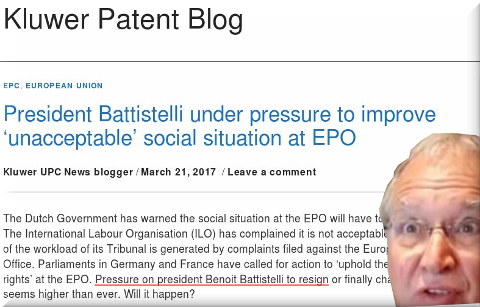

THE writers at Kluwer Patent Blog have long been the main pushers behind the UPC. That's hardly a secret. It's very easily demonstrable. There are maybe, at most, two contributors there who dare mention EPO scandals. They otherwise turn a blind eye, with a couple of exceptions very recently.
In a recent judgment rendered by the Danish Maritime and Commercial Court between Coloplast A/S (Coloplast) and Hollister Incorporated (Hollister), the Court considered whether or not Coloplast was the co-inventor (and co-owner) of a patent application filed by Hollister.
In 2011, Hollister filed its European patent application EP 11175010.5 regarding a catheter package and the EPO stated its intention to grant a European patent to Hollister on that basis. The EPO had issued a Druckexemplar including the patent claims that the EPO in-tended to grant. The Court decided to render its judgment on the basis of the Druckexem-plar.
I find the following an interesting statement: “Ramsay hopes the UK will complete the ratification formalities of the UPCA and the Protocol on Privileges and Immunities soon and that it can stay in the UP system post-Brexit”.
This is a clear (albeit indirect) acknowledgement that the UK’s post-Brexit participation is not guaranteed. Nice to see reality finally acknowledged.
However, it is a shame that it stops there. This is because many of the uncertainties over the UK’s continued participation in the UP system are equally applicable to the question of whether the UPC Agreement is (or will continue to be) compatible with EU law.
The clear (and repeated) indications from Westminster are that the UK will be leaving both the single market and the customs union, as well as the jurisdiction of the CJEU. The rationale behind this is that only by doing all of this will the UK be able to control immigration from EU Member States, and to conclude its own trade deals with other countries / regions. The government has strong drivers to stick to this rationale, including avoiding both electoral suicide and disintegration of the governing party.
It is therefore wishful thinking to believe that there can somehow be special deals to suit the interests of specific (eg financial or legal) sectors. The UK government has far more pressing problems than working out how to strike a deal that (somehow, magically) submits the UK to the jurisdiction of the CJEU (AND all potentially relevant EU laws) just for the purposes of patent and SPC disputes at the UPC. An example of the more pressing questions is how, if the UK is leaving the customs union, will it be possible to avoid putting in place a “hard” border between Northern Ireland and the Republic of Ireland? My suggestion is that hopes of the UK staying in the UP / UPC system should be put on hold until, at the very least, a workable solution to the Irish problem has been found.
Whilst such realities may not be pleasant to contemplate, we should at least acknowledge them. A good first step on this path would be, BEFORE the UPP comes into force, to pose questions to the CJEU about compliance of the UPC Agreement with EU law. The only way for this to happen is if the BVerfG admits the constitutional complaint for a full decision. Thus, arguing against admission of that complaint hardly seems a sensible strategy, as it amounts to nothing more than a wish and a prayer that the whole system will not come crashing down when reality finally bites.
At a minimum, the EPO’s vision shows what the Office wants to be. Moreover, it gives some clues about the criteria in which the EPO wants to excel and, hopefully, accepts being evaluated. Summarized briefly, these are:
o Expert, well-supported and motivated staff o Quality (EPO aims high by aiming at “standard-setting worldwide”) o Relationships (both within the EPO and the outside world) prospering through — Trust — Transparency — Fairness and — Mutual Respect o Efficient services delivered under the EPC.
I will therefore endeavour to draft a series of four contributions on this blog over the next couple of weeks, setting forth my personal experiences and opinions on where the EPO currently stands with regard to each of these criteria. As always, your comments, also critical ones, are welcome, but please stay respectful and to the point. Our overall aim should be to help reaching the EPO this commendable vision. This may (and sometimes must) include critique, but does not justify personal aggressions against persons having a different opinion than yours.